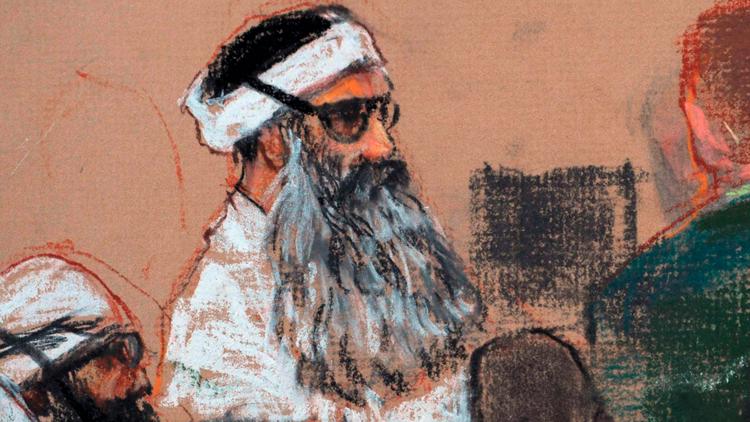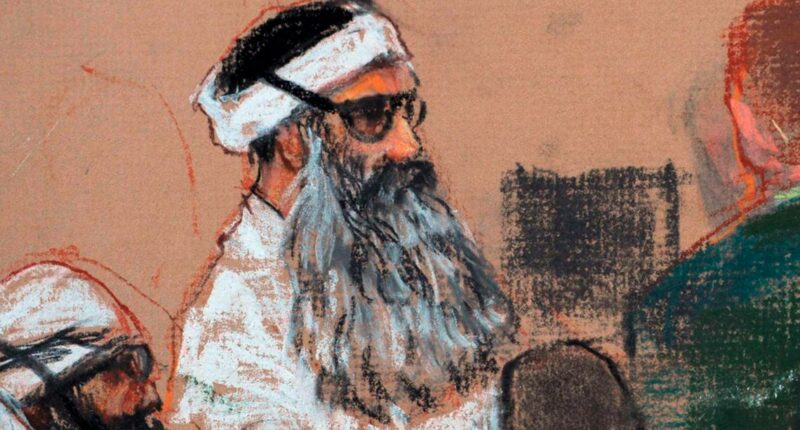Share this @internewscast.com

The case against the alleged architect of the 9/11 attacks remains unresolved after a court dismissed a plea deal that had been arranged by the government but subsequently retracted.
NEW YORK — The extensive legal proceedings in the United States concerning Khalid Sheikh Mohammed, the alleged mastermind behind the September 11 attacks, are still stuck after an appeals court nullified a plea agreement that authorities had initially put together but later decided against.
Essentially, the ruling leaves the case on track for trial before a military commission. It is unclear when that might happen.
Here’s what to know about the case and how it got here:
Khalid Sheikh Mohammed is accused mastermind of 9/11
Mohammed is accused of orchestrating and leading al-Qaida’s plan to strike the World Trade Center and the Pentagon on September 11, 2001, by crashing hijacked planes. A fourth hijacked plane crashed in a Pennsylvania field. These devastating attacks resulted in nearly 3,000 deaths, marking one of the most lethal events in American history.
Mohammed was arrested in 2003 in Pakistan and eventually taken to the U.S. military base at Guantánamo Bay, Cuba. At the time, it was where the U.S. held hundreds of men captured in President George W. Bush’s “war on terror.”
Military prosecutors filed charges in 2008 against Mohammed and some co-defendants. After an Obama-era plan to try them in a civilian court in New York collapsed, the case remained with the military commission.
The case dragged on through years of legal and logistical challenges. A major point of contention has been how much the evidence and case have been tainted by the men’s torture while in CIA custody during the first years after their capture. Mohammed was waterboarded 183 times.
The plea deal called for life in prison
Military prosecutors and defense lawyers began plea talks several years ago. Last year, Mohammed and two others agreed to plead guilty, under an agreement that would have led to life in prison instead of a potential death penalty. The deal also would have required the men to answer questions posed by Sept. 11 victims’ relatives.
Military prosecutors called the arrangement “the best path to finality and justice.” Some 9/11 families also saw the deal as the best hope for bringing the painful case to a conclusion and getting some answers from the defendants.
But other victims’ relatives said a trial was the right way to get justice and information, and some saw the plea deal as capitulation. Republican lawmakers also criticized the agreement, negotiated during Democratic President Joe Biden’s administration.
Defense secretary withdrew the plea deal
Then-Defense Secretary Lloyd Austin soon rescinded the deal, saying that victims’ relatives, U.S. troops and the American public “ deserve the opportunity ” to see military commission trials play out.
Defense attorneys and the government wrangled in various courts over whether Austin was legally able to scrap the deal. It was on-again, off-again for months. A panel of appeals judges put it on hold in January and then, on Friday, issued 2-1 ruling saying that Austin had the authority to rescind the agreement. The order bars the military judge from taking any guilty pleas under the now-undone deal.
The case could be headed to pretrial stage
It is not clear whether defense lawyers plan to appeal. A message seeking comment was sent Saturday to Mohammed’s attorneys.
Without a plea deal, the case would once again be back in the pretrial stage within the military commission system, with the legal and logistical complications that it has faced. Questions about whether the men’s torture would prevent the use of evidence, including statements they made, are yet to be resolved.
Copyright 2025 Associated Press. All rights reserved. This material may not be published, broadcast, rewritten, or redistributed.
















